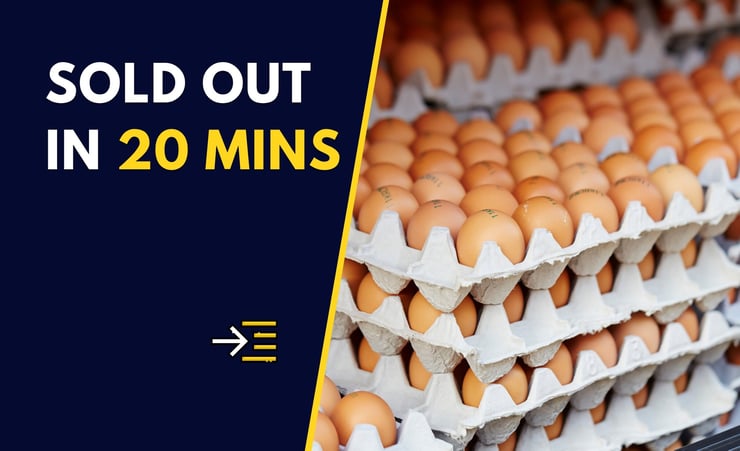Egg shortage: Free range egg farmers dealing with huge demand

Free range egg farmers are fielding constant calls and managing a flood of customers at farmers' markets as New Zealanders struggle to get their hands on eggs.
This comes as the Poultry Industry Association warns the country is still around 400,000 laying hens short and it is going to be months before the situation improves.
A free range egg business in Canterbury, Little Red Farm, said at the Ohoka Farmers Market it had been "absolute madness" recently, they had sold out of eggs only 20 minutes after the market started and last week customers had been lining up an hour before they opened.
Warkworth-based free range egg farmer Phillipa Stichbury-Cooper said it was a similar story at the Matakana Farmers Market, with some keen customers showing up at 6am to secure a dozen.
"At the moment it's full noise... because it's holiday season all the cafes want more than they normally have, all the public want more ... we've got people coming to the [farm] gate and buying eggs because nobody's got any eggs."
Brogan White from the Old Fashioned Egg Company in Canterbury said she was receiving constant phone calls from existing and prospective customers at the moment, but it was impossible to quickly boost production.
She also believed the amount of coverage the shortage had received was prompting some people to "panic buy", which was exacerbating the shortage.
White said unfortunately a constrained supply of eggs had hit at a time when costs on farm were soaring, and those increases had to be passed on to customers.
"We've had major increases [in the price] of our feed, chicks ... all of our running costs have actually gone through the roof and that's why a lot of these small free range farms are shutting down, because we just cannot make ends meet."
Supplies set to remain tight
As word of New Zealand's depleted egg stocks has spread, Michael Brooks from the Poultry Industry Association said he had been receiving interview requests from major international news outlets including the BBC, CNN and ABC.
Brooks said the country was still 400,000 laying hens short and egg supplies would remain tight for several months yet. Even though some farmers were buying more chicks, it took 18 weeks for them to start laying
"So that's May anyway... so we are seeing the chick numbers rising but it's going to take time."
It was a major concern Countdown and Foodstuffs were pushing ahead with plans to stop stocking colony cage eggs in their supermarkets by 2025 and 2027, Brooks said.
Colony cages housed 30 percent of the national flock and had been endorsed by the Ministry for Primary Industries code of welfare for layer hens, he said.
Brooks said supermarkets should allow consumers to vote with their wallets.
"Don't play moral arbiter, let customers make the choice," he said.
Brooks said he had requested a meeting with Foodstuffs and Countdown to discuss the poultry industry's concerns.
A Foodstuffs spokesperson said legislation introduced by the government to remove caged eggs by 2023 had temporarily decreased the overall supply of eggs.
The spokesperson said it would continue to work with the egg supply industry to smooth the transition and increase its offer in other types of eggs.
"It's a significant change for the egg supply industry and to help support the transition, and to make sure customers get a fair shake when they shop, a number of Foodstuffs stores have put temporary limits on how many eggs customers can buy."




